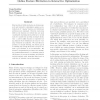Free Online Productivity Tools
i2Speak
i2Symbol
i2OCR
iTex2Img
iWeb2Print
iWeb2Shot
i2Type
iPdf2Split
iPdf2Merge
i2Bopomofo
i2Arabic
i2Style
i2Image
i2PDF
iLatex2Rtf
Sci2ools
135
Voted
ICML
2009
IEEE
2009
IEEE
Online feature elicitation in interactive optimization
Most models of utility elicitation in decision support and interactive optimization assume a predefined set of "catalog" features over which user preferences are expressed. However, users may differ in the features over which they are most comfortable expressing their preferences. In this work we consider the problem of feature elicitation: a user's utility function is expressed using features whose definitions (in terms of "catalog" features) are unknown. We cast this as a problem of concept learning, but whose goal is to identify only enough about the concept to enable a good decision to be recommended. We describe computational procedures for identifying optimal alternatives w.r.t. minimax regret in the presence of concept uncertainty; and describe several heuristic query strategies that focus on reduction of relevant concept uncertainty.
Heuristic Query Strategies | ICML 2009 | Machine Learning | Relevant Concept Uncertainty | Utility Elicitation |
Related Content
| Added | 17 Nov 2009 |
| Updated | 17 Nov 2009 |
| Type | Conference |
| Year | 2009 |
| Where | ICML |
| Authors | Craig Boutilier, Kevin Regan, Paolo Viappiani |
Comments (0)

